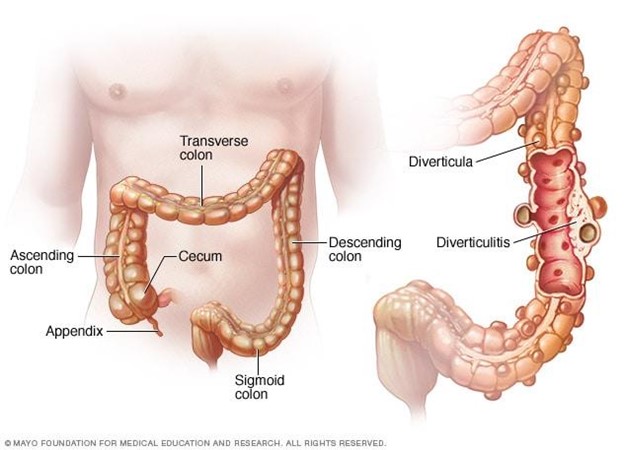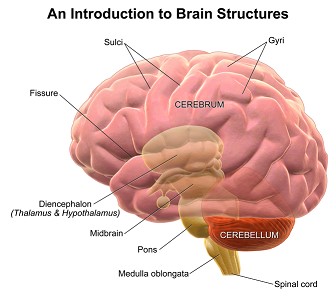A nurse is creating an education plan for a client who has diverticulosis. The nurse should plan to include which of the following in the client education?
Increase protein from red meat
Decrease fluid intake
Incorporate soft foods that are pureed in consistency
Increase dietary fiber
The Correct Answer is D
Choice A Reason: Increasing protein from red meat is not part of client education, as it can worsen the condition and increase the risk of complications. Red meat is high in fat and low in fiber, which can cause constipation and increase the pressure in the colon. Diverticulosis is a condition where small pouches or sacs form in the wall of the colon due to weak spots or increased pressure.
Choice B Reason: Decreasing fluid intake is not part of client education, as it can worsen the condition and increase the risk of complications. Fluid intake should be increased to prevent dehydration and promote bowel movements. Diverticulosis can cause abdominal pain, bloating, cramping, and changes in bowel habits.
Choice C Reason: Incorporating soft foods that are pureed in consistency is not part of client education, as it can worsen the condition and increase the risk of complications. Soft foods are low in fiber and can cause constipation and increase the pressure in the colon. Diverticulosis can lead to diverticulitis, which is inflammation or infection of the pouches or sacs.
Choice D Reason: This is the correct choice. Increasing dietary fiber is part of client education, as it can improve the condition and prevent complications. Fiber helps soften the stool and reduce the pressure in the colon. Diverticulosis can be managed by eating a high-fiber diet, drinking plenty of fluids, exercising regularly, and avoiding straining or holding stools.

Nursing Test Bank
Naxlex Comprehensive Predictor Exams
Related Questions
Correct Answer is D
Explanation
Choice A Reason: Increasing protein from red meat is not part of client education, as it can worsen the condition and increase the risk of complications. Red meat is high in fat and low in fiber, which can cause constipation and increase the pressure in the colon. Diverticulosis is a condition where small pouches or sacs form in the wall of the colon due to weak spots or increased pressure.
Choice B Reason: Decreasing fluid intake is not part of client education, as it can worsen the condition and increase the risk of complications. Fluid intake should be increased to prevent dehydration and promote bowel movements. Diverticulosis can cause abdominal pain, bloating, cramping, and changes in bowel habits.
Choice C Reason: Incorporating soft foods that are pureed in consistency is not part of client education, as it can worsen the condition and increase the risk of complications. Soft foods are low in fiber and can cause constipation and increase the pressure in the colon. Diverticulosis can lead to diverticulitis, which is inflammation or infection of the pouches or sacs.
Choice D Reason: This is the correct choice. Increasing dietary fiber is part of client education, as it can improve the condition and prevent complications. Fiber helps soften the stool and reduce the pressure in the colon. Diverticulosis can be managed by eating a high-fiber diet, drinking plenty of fluids, exercising regularly, and avoiding straining or holding stools.

Correct Answer is D
Explanation
Choice A Reason: This is incorrect because encouraging coughing and deep breathing can increase intracranial pressure (ICP), which is the pressure inside the skull that can affect brain function. Coughing and deep breathing can increase blood flow and oxygen demand to the brain, which can worsen cerebral edema. The nurse should suction the patient as needed and maintain a patent airway.
Choice B Reason: This is incorrect because positioning the patient with knees and hips flexed can increase ICP by reducing venous drainage from the head. The nurse should position the patient with neck and body in alignment and avoid extreme flexion or extension of any joints.
Choice C Reason: This is incorrect because performing nursing interventions once an hour can disturb the patient's sleep and increase ICP by stimulating brain activity. The nurse should cluster nursing interventions and provide quiet and dark environment to promote rest and reduce stress.
Choice D Reason: This is correct because keeping the head of the bed elevated to 30 degrees can decrease ICP by facilitating venous drainage from the head and reducing cerebral blood volume. The nurse should monitor the patient's blood pressure and pulse to ensure adequate cerebral perfusion.

Whether you are a student looking to ace your exams or a practicing nurse seeking to enhance your expertise , our nursing education contents will empower you with the confidence and competence to make a difference in the lives of patients and become a respected leader in the healthcare field.
Visit Naxlex, invest in your future and unlock endless possibilities with our unparalleled nursing education contents today
Report Wrong Answer on the Current Question
Do you disagree with the answer? If yes, what is your expected answer? Explain.
Kindly be descriptive with the issue you are facing.
